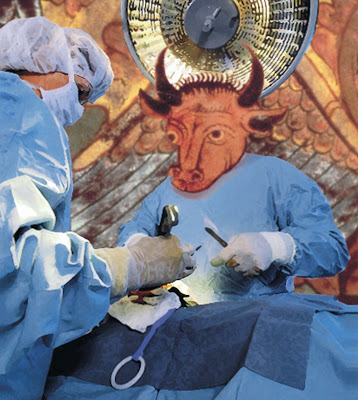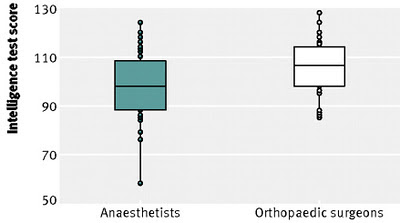Neuroscience
 from Subramanian et al. 2011 [Image: Clive Featherstone]
from Subramanian et al. 2011 [Image: Clive Featherstone]
Every year, BMJ [British Medical Journal] has a special Christmas issue with spoof articles and silly studies. Favorites from the past include:
The clear winner this year is a revenge piece by a group of orthopaedic surgeons and trainees (Subramanian et al., 2011) that convincingly demonstrates they are stronger and smarter [?] than their colleagues the anesthesiologists (anaesthetists in the UK). The motivation for such a study is as follows:
 Fig 3 (Subramanian et al. 2011). Box plot of intelligence test score by specialty. Upper and lower whiskers represent 1.5 times and −1.5 times interquartile range; upper and lower hinges represent 25% and 75% quartiles; middle represents median or 50% quartile
Fig 3 (Subramanian et al. 2011). Box plot of intelligence test score by specialty. Upper and lower whiskers represent 1.5 times and −1.5 times interquartile range; upper and lower hinges represent 25% and 75% quartiles; middle represents median or 50% quartile
The means for IQ were 98.38 for the anaesthetists vs. 105.19 for the orthopaedists, which squeaked in as a significant difference at p=0.0489 (although there was quite a bit of overlap between the groups). A few more things are notable about this result:(1) mean IQ for the entire population is 100, and it would be surprising if licensed professionals who are graduates of medical schools and residency programs were of entirely average intelligence. A 2002 paper {PDF} on male high school graduates in Wisconsin (class of 1957)1 found that doctors had the highest IQ (120) of all professions.(2) One anaesthetist tested in the mentally retarded range: below 70, which is over two standard deviations from the average IQ of 100. This would make him a very unique savant anesthesiologist. At any rate, if you threw out his score, the difference between groups would no longer be significant.(3) Test results from two more anaesthetists suggested borderline intellectual functioning (between 70–84). A couple more doctors from each category were right on the edge of this borderline, which again would be highly improbable.
The authors did acknowledge some of these weaknesses:
But who am I to be a scrooge and spoil the fun of the orthopaedic surgeons, who think they finally have intellectual bragging rights over the anesthesiologists?
Footnote
1 Obviously, that study (Hauser, 2002) was based on very old data from one US state. Results may differ in the contemporary UK, as described in this authoritative report in the Daily Mail: Why doctors are not as clever as they used to be.
Reference
Subramanian, P., Kantharuban, S., Subramanian, V., Willis-Owen, S., & Willis-Owen, C. (2011). Orthopaedic surgeons: as strong as an ox and almost twice as clever? Multicentre prospective comparative study BMJ, 343 (dec15 1) DOI: 10.1136/bmj.d7506
- Christmas Cheer From Bmj
Fig 1 (Firth et al., 2009). X ray pictures can easily detect an ingested coin. Position of coin on lateral view (left), relative to anterior (right) or posterior picture affects size of image on film. Every year, BMJ has a special Christmas issue with...
- Sex, Aggression, And Humour: Responses To Unicycling
Juggling unicyclist and UTSA graduate Ian Bexar Maurer-Stothert 'Tis the season for the British Medical Journal's satire issue to lighten the holiday mood. Last year's gems included 2007 Ig Nobel Prize winner, Sword Swallowing and Its...
- Virginia Apgar!
Most everyone reading this will have had a closer degree of connection with Virginia Apgar than they know. Who is Virginia Apgar, you ask? When born, most of you will have received an Apgar Score in the delivery room. She created it. Did you know?......
- Mirror Neurons & Video Games
Been reading about mirror neurons a lot lately; first in the April issue of Scientific American Mind (abstract only) and now in the New York Times (from June 4, subscription may be required). SciAm suggests that mirror neurons are how we learn from the...
- Penn Neurosurgery Welcomes Ali K. Ozturk, Md
Ali K. Ozturk, MD, has joined Penn Neurosurgery as an Assistant Professor. Dr Ozturk received his BA in biology from Johns Hopkins University and his medical degree from the Yale University School of Medicine. He then completed a residency in neurosurgery...
Neuroscience
Orthopedic Surgeons vs. Anesthesiologists
 from Subramanian et al. 2011 [Image: Clive Featherstone]
from Subramanian et al. 2011 [Image: Clive Featherstone]Every year, BMJ [British Medical Journal] has a special Christmas issue with spoof articles and silly studies. Favorites from the past include:
- Sword Swallowing And Its Side Effects
- Sex, aggression, and humour: responses to unicycling
- Rage Against the Machine Syncope and the Texting Sign
- Why are the letters "z" and "x" so popular in drug names?
The clear winner this year is a revenge piece by a group of orthopaedic surgeons and trainees (Subramanian et al., 2011) that convincingly demonstrates they are stronger and smarter [?] than their colleagues the anesthesiologists (anaesthetists in the UK). The motivation for such a study is as follows:
A humorous anaesthetic colleague recently repeated the following popular saying while an operating table was being repaired with a mallet: “typical orthopaedic surgeon—as strong as an ox but half as bright.” Making fun of orthopaedic surgeons is a popular pastime in operating theatres throughout the country. This pursuit has recently spread to the internet; a humorous animation entitled “orthopedia vs anesthesia” had received more than half a million hits at the time of writing.1 Several comparisons of orthopaedic surgeons to primates have been published, and the medical literature contains suggestions that orthopaedic surgery requires brute force and ignorance.2 3 4The stereotypical image of the strong but stupid orthopaedic surgeon has not been subject to scientific scrutiny. Previous studies have shown that the average hand size of orthopaedic surgeons is larger than that of general surgeons.2 3 However, a search of the worldwide scientific literature found no studies assessing the strength or intelligence of orthopaedic surgeons. In the absence of a cohort of willing oxen as a control group, and given that the phrase is popular with anaesthetists, we designed this study to compare the mean grip strength of the dominant hand and the intelligence test score of orthopaedic surgeons and anaesthetists.The participants in the study were 36 male orthopaedic surgeons (there were no female OS's available) and 40 male anaesthetists (the six women who volunteered were excluded). They were recruited from three hospitals over a 2 week period. Grip strength was tested with a hand dynamometer. The proxy for IQ was rather unacceptable however - the Mensa Brain Test version 1.1.0 administered on an iPhone 4. The validity of the IQ measure was apparently irrelevant and the results were actually laughable, befitting the spoof study format.
 Fig 3 (Subramanian et al. 2011). Box plot of intelligence test score by specialty. Upper and lower whiskers represent 1.5 times and −1.5 times interquartile range; upper and lower hinges represent 25% and 75% quartiles; middle represents median or 50% quartile
Fig 3 (Subramanian et al. 2011). Box plot of intelligence test score by specialty. Upper and lower whiskers represent 1.5 times and −1.5 times interquartile range; upper and lower hinges represent 25% and 75% quartiles; middle represents median or 50% quartileThe means for IQ were 98.38 for the anaesthetists vs. 105.19 for the orthopaedists, which squeaked in as a significant difference at p=0.0489 (although there was quite a bit of overlap between the groups). A few more things are notable about this result:(1) mean IQ for the entire population is 100, and it would be surprising if licensed professionals who are graduates of medical schools and residency programs were of entirely average intelligence. A 2002 paper {PDF} on male high school graduates in Wisconsin (class of 1957)1 found that doctors had the highest IQ (120) of all professions.(2) One anaesthetist tested in the mentally retarded range: below 70, which is over two standard deviations from the average IQ of 100. This would make him a very unique savant anesthesiologist. At any rate, if you threw out his score, the difference between groups would no longer be significant.(3) Test results from two more anaesthetists suggested borderline intellectual functioning (between 70–84). A couple more doctors from each category were right on the edge of this borderline, which again would be highly improbable.
The authors did acknowledge some of these weaknesses:
The intelligence scores were lower than anticipated for IQ in the medical profession. This is likely to be a reflection of the way in which intelligence was tested, and the scores derived from the rather difficult Mensa brain test may not be directly comparable to IQ scores. We selected the abbreviated Mensa test carried out by touch screen for speed and convenience. Full formal IQ testing is more time consuming and cumbersome and would have affected doctors’ willingness to participate in this study.Moving on to the other major finding, it was no surprise that the orthopaedic surgeons had greater grip strength than the anaesthetists (p=0.0274). But a quick peak at Fig 2 shows that one exceptionally strong OS helped drive this small difference.
But who am I to be a scrooge and spoil the fun of the orthopaedic surgeons, who think they finally have intellectual bragging rights over the anesthesiologists?
ConclusionThe stereotypical image of male orthopaedic surgeons as strong but stupid is unjustified in comparison with their male anaesthetist counterparts. The comedic repertoire of the average anaesthetist needs to be revised in the light of these data. However, we would recommend caution in making fun of orthopaedic surgeons, as unwary anaesthetists may find themselves on the receiving end of a sharp and quick witted retort from their intellectually sharper friends or may be greeted with a crushing handshake at their next encounter.
Footnote
1 Obviously, that study (Hauser, 2002) was based on very old data from one US state. Results may differ in the contemporary UK, as described in this authoritative report in the Daily Mail: Why doctors are not as clever as they used to be.
Reference
Subramanian, P., Kantharuban, S., Subramanian, V., Willis-Owen, S., & Willis-Owen, C. (2011). Orthopaedic surgeons: as strong as an ox and almost twice as clever? Multicentre prospective comparative study BMJ, 343 (dec15 1) DOI: 10.1136/bmj.d7506
- Christmas Cheer From Bmj
Fig 1 (Firth et al., 2009). X ray pictures can easily detect an ingested coin. Position of coin on lateral view (left), relative to anterior (right) or posterior picture affects size of image on film. Every year, BMJ has a special Christmas issue with...
- Sex, Aggression, And Humour: Responses To Unicycling
Juggling unicyclist and UTSA graduate Ian Bexar Maurer-Stothert 'Tis the season for the British Medical Journal's satire issue to lighten the holiday mood. Last year's gems included 2007 Ig Nobel Prize winner, Sword Swallowing and Its...
- Virginia Apgar!
Most everyone reading this will have had a closer degree of connection with Virginia Apgar than they know. Who is Virginia Apgar, you ask? When born, most of you will have received an Apgar Score in the delivery room. She created it. Did you know?......
- Mirror Neurons & Video Games
Been reading about mirror neurons a lot lately; first in the April issue of Scientific American Mind (abstract only) and now in the New York Times (from June 4, subscription may be required). SciAm suggests that mirror neurons are how we learn from the...
- Penn Neurosurgery Welcomes Ali K. Ozturk, Md
Ali K. Ozturk, MD, has joined Penn Neurosurgery as an Assistant Professor. Dr Ozturk received his BA in biology from Johns Hopkins University and his medical degree from the Yale University School of Medicine. He then completed a residency in neurosurgery...
